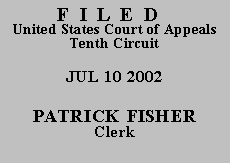

| STEVEN KENT BLOOM, |
|
| v. | |
| K. RUHNKE, Kansas Department of Corrections Administrator, KANSAS DEPARTMENT OF CORRECTIONS, and STATE OF KANSAS, |
Pro se Plaintiff Stephen Bloom, an inmate at the Lansing Correctional Facility in Lansing, Kansas ("Lansing"), appeals the district court's dismissal of his 42 U.S.C. § 1983 complaint. We exercise jurisdiction under 28 U.S.C. § 1291 and affirm in part, reverse in part, and remand for further proceedings.
Plaintiff's complaint centers around Lansing's Internal Management Policy and Procedures 11-101, which restricts inmates from spending more than $30 per month from their prisoner accounts. By the end of September 2001, Plaintiff had reached his monthly limit but found himself needing $4.00 to obtain copies of legal authority from the Kansas University Law Library. On September 24, 2001, he submitted a Special Purchase Order for the expense, stating that he felt the $4.00 was a legal expense and therefore exempt from the monthly spending cap. Prison officials disagreed with Plaintiff's characterization of the expense and denied his request. On October 1, 2001, he submitted a second request, which was denied. He appealed the decision to the Lansing Warden and then the Kansas Secretary of Corrections. The initial denial was affirmed.
Plaintiff filed the present civil action in the District of Kansas on November 20, 2001, alleging deprivations of his right to free access to the courts and freedom of speech. The district court dismissed the complaint sua sponte for failure to state a claim upon which relief may be granted. Such sua sponte dismissal is permitted under 28 U.S.C. § 1915A, although the district court cited to 28 U.S.C. § 1915 (which did not apply to Plaintiff because he did not file in forma pauperis).
We review § 1915A dismissals de novo. Cf. Perkins v. Kansas Dep't of Corrections, 165 F.3d 803, 806 (10th Cir. 1999) (noting that, because the language of § 1915(e)(2)(B)(ii) parallels that found in Fed. R. Civ. P. 12(b)(6), dismissals under that section are also reviewed de novo). "[W]e must liberally construe the allegations of a pro se complaint." Hunt v. Uphoff, 199 F.3d 1220, 1223 (10th Cir. 1999).
We agree with the district court that Plaintiff's claim of denial of access to the courts fails to state a claim upon which relief can be granted. In Penrod v. Zavaras, 94 F.3d 1399, 1403 (10th Cir. 1996), we held that a prisoner raising a denial-of-access claim must show "that the denial of legal resources hindered the prisoner's efforts to pursue a nonfrivolous claim." Nowhere in Plaintiff's complaint does he mention the purpose for which he requires the copies of legal cases, nor does he allege that Lansing's spending cap hindered his efforts to pursue a nonfrivolous legal claim. His claim therefore fails to satisfy Penrod.
We must reverse, however, on Plaintiff's free speech claim. "It is well settled that the First Amendment protects the flow of information to prisoners; any limitation must reasonably relate to a legitimate penological interest." Crofton v. Roe, 170 F.3d 957, 959 (9th Cir. 1999); see Mann v. Smith, 796 F.2d 79, 82-83 (5th Cir. 1986). Defendants may well have a reasonable justification for limiting how much a prisoner can spend each month on reading materials. They may be able to demonstrate that justification at trial or through a motion for summary judgment. But the record is now limited to Plaintiff's complaint, which we must accept as true. Therefore, we must reverse the district court's dismissal of this claim and remand for further proceedings.
We AFFIRM the judgment of the district court with respect to Plaintiff's claim of denial of free access to the courts. We REVERSE the district court's dismissal of Plaintiff's claim for violation of his right of free speech and REMAND for further proceedings. We also DENY both Appellant's Motion to Strike Appellees' Notice of Service of Amendment to Appellees' Brief and Appellee's request to dismiss the appeal.
Entered for the Court
Harris L Hartz
Circuit Judge
*.This order and judgment is not binding precedent, except under the doctrines of law of the case, res judicata, and collateral estoppel. The court generally disfavors the citation of orders and judgments; nevertheless, an order and judgment may be cited under the terms and conditions of 10th Cir. R. 36.3.